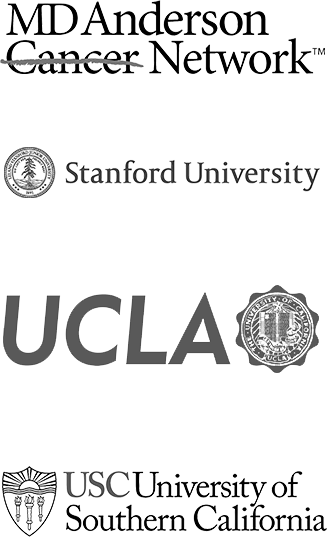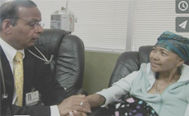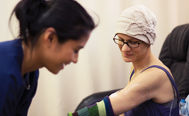Leukemia
Leukemia is cancer of the blood cells and while it’s known to strike children, the disease actually develops more frequently in adults, especially men. The cancer begins in the soft tissue inside bones (i.e. bone marrow) which produces three different types of blood cells:
- Platelets – help blood to clot
- White blood cells – fight infections
- Red blood cells – carry oxygen
Leukemia occurs when bone marrow produces abnormal white blood cells (“leukemia cells”). The disease is categorized by the type of blood cells it attacks and rate at which it grows:
- Blood cell types
- Lymphocytic (or lymphoblastic) leukemia affects white blood cells called lymphocytes.
- Myelogenous leukemia affects the other type of cells that normally become granulocytes, red blood cells, or platelets.
- Growth rate
- Acute leukemia gets worse very fast and may make you feel sick right away.
- Chronic leukemia gets worse slowly and may not cause symptoms for years.
The classifications identify four of the more common types of leukemia as:
- Acute lymphoblastic leukemia (ALL)
- Acute myelogenous leukemia (AML)
- Chronic lymphocytic leukemia (CLL)
- Chronic myelogenous leukemia (CML)
Leukemia Overview
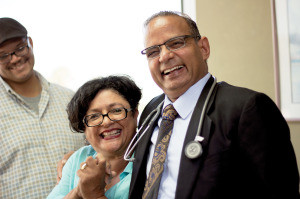 The disease typically doesn’t manifest symptoms until its later stages making it difficult to diagnose at the time of onset. Knowing family medical history and noticing any unusual physical changes that persist can help towards early diagnosis. When symptoms persist, a medical specialist should be consulted.
The disease typically doesn’t manifest symptoms until its later stages making it difficult to diagnose at the time of onset. Knowing family medical history and noticing any unusual physical changes that persist can help towards early diagnosis. When symptoms persist, a medical specialist should be consulted.
Dr. Sant Chawla and every physician at the Cancer Center of Southern California are committed to helping patients fight cancer through early diagnosis and treatment. We apply a multi-disciplinary approach and partner with patients throughout treatment. Patients are encouraged to participate in their own medical care and make informed decisions for themselves. Our physicians are dedicated to helping patients with life-saving cancer treatments. Our oncologists have led advanced clinical cancer research and conducted groundbreaking work and through our research, have access to the most advanced therapies for our patients.
Symptoms
As white blood cells overproduce, vital organ functions eventually are impacted. An insufficient number of red blood cells would limit oxygen production and reduced platelet count inhibits proper clotting. Not having a sufficient number of normal white blood cells would ultimately interfere with the body’s ability to fight infection.

Given the different types of leukemia, symptoms typically depend on the type of leukemia, however, the more general sort of symptoms include:
- Fever, chills
- Fatigue, weakness
- Loss of appetite, weight loss
- Night sweats
- Bone/joint pain
- Abdominal discomfort
- Headaches
- Shortness of breath
- Frequent infections
- Easy bruising or bleeding
- Petechiae (small red spots under the skin)
As leukemia advances, symptoms become more pronounced and noticeable as:
Anemia and associated symptoms, such as fatigue, pallor, and a general feeling of illness.
Bruising or bleeding from the gums or nose, or in the stool or urine.
Weakness to infections such as sore throat or bronchial pneumonia
Swollen lymph nodes usually in the throat, armpits, or groin.
Loss of appetite and weight.
Swelling or pain under the left lower ribs (caused by a swollen spleen).
When blood tests reveal abnormal results, a bone marrow biopsy could be performed. This test will reveal the type of leukemia and an appropriate treatment plan can be developed.
Learn more about leukemia basics from WebMD.com.
Treatment
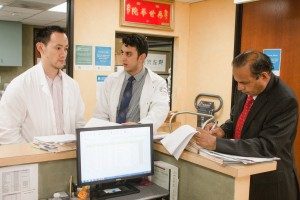 The purpose of treatment is destroying the leukemia cells and allowing normal cells to grow in the bone marrow. A treatment plan depends on the type of leukemia, its stage, and personal characteristics of the patient.
The purpose of treatment is destroying the leukemia cells and allowing normal cells to grow in the bone marrow. A treatment plan depends on the type of leukemia, its stage, and personal characteristics of the patient.
Chronic Lymphoblastic & Chronic Myelogenous
These cancers often grow slowly and might not require immediate treatment. The treatments commonly used for chronic subtypes of leukemia include:
- Interferon
- Chemotherapy
- Targeted therapy
- Supportive care
- Stem cell transplant
Targeted therapy drugs are the main treatment for chronic myelogenous leukemia with leukapheresis, surgery, or radiation therapy used less often.
Acute Lymphoblastic & Acute Myelogenous
The main types of treatment are:
- Chemotherapy
- Targeted therapy
- Stem cell transplant
Other treatments such as surgery and radiation therapy may be used in special circumstances. Treatment can typically last for about two years with initial treatment fairly intense.
After five years, a patient is usually considered cured of the disease; however, it is not uncommon for a recurrence within the first few years of treatment. At that time, a patient could be considered for a clinical trial. Our Cancer Center physicians have led many clinical trials with access to the most advanced drug therapy treatments for their patients.
The Cancer Center of Southern California collaborates with prominent pathologists, surgeons, radiologists, and radiation oncologists from institutions such as UCLA, USC, Stanford, M.D. Anderson, St. John’s and Cedars Sinai to develop and implement the most effective multi-modal treatment plans for our patients. Before developing a course of treatment, we evaluate the stage and grade of the tumor, previous treatments (if any), extent of the cancer, biopsy results, and other unique factors. As leaders in advanced clinical research and trials, we have access to the most novel cancer drugs enabling us to exceed standard treatment whenever needed.
Clinical Trials
The Cancer Center physicians actively participate in clinical trials working with the newest drugs and through this involvement, can offer the most advanced treatment plan for each individual.
Contact the Cancer Center Experts for More Information
The emotional and physical well-being of our patients is a respected component of our treatment. Each patient receives the careful attention of an expert team of medical specialists through our multi-modal treatment approach. Please contact our center at 310-552-9999 to schedule a consultation with one of our Los Angeles physicians.
Next, read about lung cancer.

